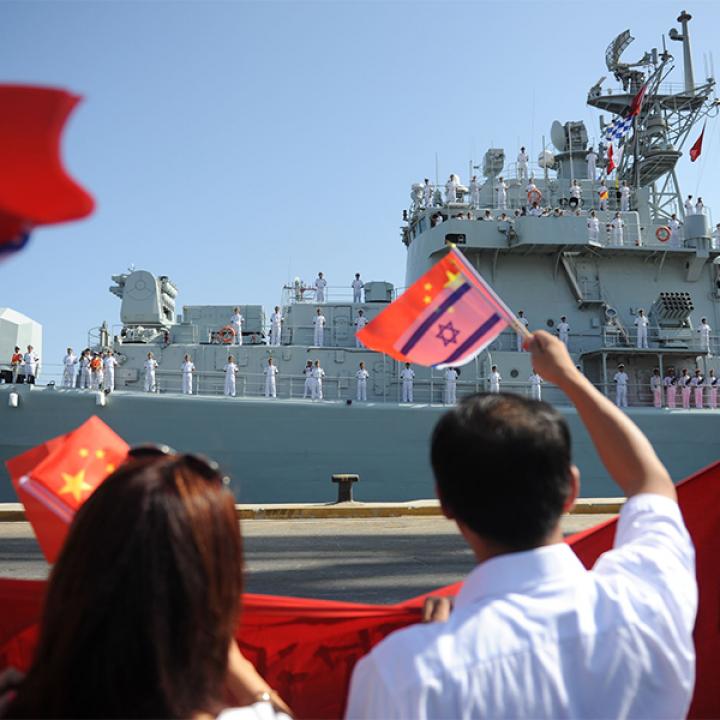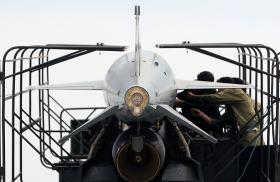
- Policy Analysis
- Fikra Forum
Thomas Parker’s Response to David Pollock’s “Iran, Israel, Syria, and the U.S.: Views From China"

David Pollock’s thoughtful item on Chinese views of the Middle East reminded me of my periodic discussions with Chinese officials over the years on the same subject.
Overall, China has a negative opinion of the U.S. role in the region—though Beijing’s views are sometimes nuanced and occasionally outright positive.
Why is China’s outlook mainly negative? First, China does not like the United States to use military force in the Middle East because Beijing resents America’s international military predominance, particularly in East Asia where it serves to constrain Chinese behavior towards Taiwan and the South and East China Seas.
This negative view was reflected in a program about the U.S. role in Syria that I saw on Chinese television in May 2018. The program was filled with large, somewhat hulking, U.S. military personnel bristling with the most advanced battle gear and ominous music in the background. At first I thought I was watching a Chinese rip-off of an old Star Wars film. Nor was there mention of the fact that there are many more Russian, Iranian, and Hezbollah forces in Syria than the United States has there.
Two Chinese think tank experts provided commentary for these somber images. One presented quite objective observations, pointing out that President Trump wanted to enforce chemical weapons “red-lines” unlike President Obama’s unfulfilled pledge in 2013. The second commentator, however, offered a Marxist caricature of U.S. foreign policy by citing the “military-industrial complex,” including the firms that benefited from the expenditure of U.S. cruise missiles, as drivers of U.S. policy. Both commentators had negative slants, but one take was much more sophisticated than the other
A second reason for China’s largely negative view of U.S. policy in the Middle East is that Beijing believes Washington often pursues counter-productive policies – even for its own interests, let alone for China’s. China officials feel that the U.S. military interventions in Iraq and Libya spawned chaotic civil wars. In the case of Libya, China had to withdraw thousands of Chinse workers who were involved in major infrastructure projects there. Nor did China approve of Obama’s attempt to push Egyptian president Mubarak out the door. China is more comfortable with authoritarian dictators like Assad, Saddam, and Qaddafi than with the uncertainty and potential chaos of democratic elections.
Chinese Views Can Be Complicated
Beijing opposed the 2003 U.S. intervention in Iraq because of its general opposition to the use of U.S. military power. However, it eventually concluded that the intervention served Chinese interests by drawing Washington’s attention away from East Asia towards the Middle East and by causing U.S. public opinion to turn more dovish towards the use of military force in general.
China even thinks that the United States sometimes plays a positive role in the Middle East. China sees the need for the United States to defeat ISIS in Iraq and Syria—though Beijing believes that Washington created the mess in the first place. Moreover, Chinese officials acknowledge that President H.W. Bush’s intervention in the first Gulf War and President Nixon’s “even-handed” diplomacy during the 1973 Arab-Israeli War served the cause of stability and Chinese interests. Significantly, however, China reluctantly came around to supporting the First Gulf War only after Beijing saw that it went so well. Beijing’s views about these two exceptions are not surprising since it holds Nixon and H. W. Bush in high regard, unlike its attitude towards their successors.
China also recognizes that the United States and China have parallel interests in the pursuit of moderate oil prices in the Middle East. Beijing has no problem with friendly U.S.-Gulf relations. And it is comfortable if the United States acts to rein in Israeli military actions against Syria and Iran, for example, which Beijing generally finds de-stabilizing (if understandable). China shares U.S. and Israeli concerns about Iranian adventurism in the Middle East, but feels it can’t do much about the situation, especially given that Iran provides about seven percent of Chinese oil imports.
In short, China is wary of the U.S. role in the Middle East. It dislikes American military power as a general principle and sometimes believes that it is used recklessly. Beijing wants a U.S. with a lower profile in the region but acknowledges that it can sometimes play a useful role there – particularly if Washington uses its power more prudently. In the Middle East, China’s first goal is stability; its second and third goals are stability as well.


